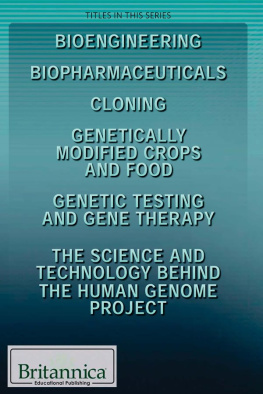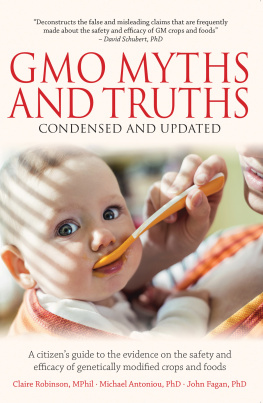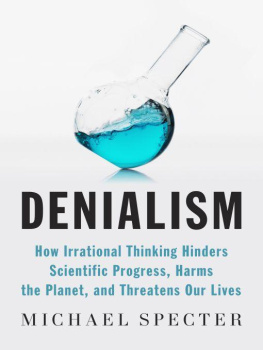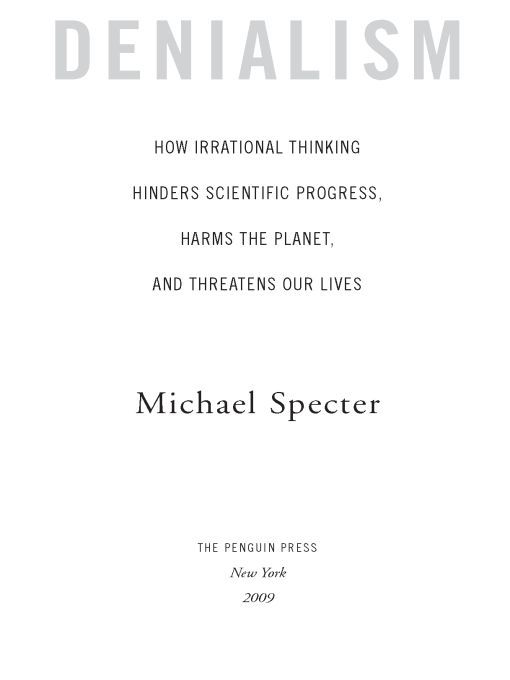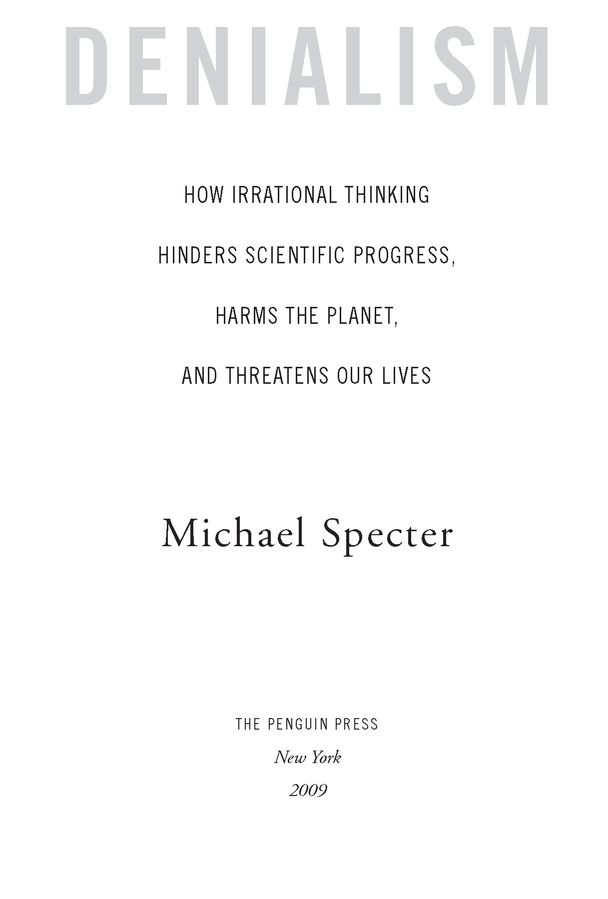Table of Contents
To Emma, who all by herself
is reason enough to reject denialism.
INTRODUCTION
Ten years ago, while walking through Harvard Yard, I saw a student wearing a button that said Progressives against Scientism. I had no idea what that meant, so I asked him. Sci entism, he explained, is the misguided belief that scientists can solve problems that nature cant. He reeled off a series of technologies that demonstrated the destructiveness of what he called the scientific method approach to life: genetically modified foods, dams, nuclear power plants, and pharmaceuticals all made the list. We talked for a few minutes, then I thanked him and walked away. I didnt understand how science might be responsible for the many scars humanity has inflicted upon the world, but students have odd intellectual infatuations, and I let it slip from my mind.
Over the next few years, while traveling in America and abroad, I kept running into different versions of that student, people who were convinced that, largely in the name of science, we had trespassed on natures ground. The issues varied, but not the underlying philosophy. Society had somehow forgotten what was authentic and there was only one effective antidote: embrace a simpler, more natural way of life. No phenomenon has illustrated those goals more clearly than persistent opposition to genetically engineered food. This whole world view that genetically modified food is there so we have no choice but to use it is absolutely terrifying and it is wrong, Lord Peter Melchett, a former British Labour minister, told me when I met him a few years ago.
Today, Lord Melchett, whose great-grandfather founded one of the worlds largest chemical companies, is policy director of the British Soil Association, the organic food and farming organization. The first time we spoke, however, he served as executive director of Greenpeace, where he was in the midst of leading a furious campaign against Monsanto (which he referred to as Monsatan) to rid the world of genetically engineered foods. There is a fundamental question here, he said. Is progress really just about marching forward? We say no. We say it is time to stop assuming that discoveries only move us forward. The war against nature has to end. And we are going to stop it.
I felt thenas I do nowthat he had gotten it exactly wrong; scientists werent waging a war at all, he wasagainst science itself. Still, I saw Lord Melchett as a quaint aristocrat who found an interesting way to shrug off his familys industrial heritage. His words were hard to forget, though, and I eventually came to realize why: by speaking about a war against nature, he had adopted a system of belief that can only be called denialism. Denialists like Lord Melchett replace the rigorous and open-minded skepticism of science with the inflexible certainty of ideological commitment.
We have all been in denial at some point in our lives; faced with truths too painful to accept, rejection often seems the only way to cope. Under those circumstances, facts, no matter how detailed or irrefutable, rarely make a difference. Denialism is denial writ largewhen an entire segment of society, often struggling with the trauma of change, turns away from reality in favor of a more comfortable lie.
Denialism comes in many forms, and they often overlap. Denialists draw direct relationships where none existbetween childhood vaccinations, for example, and the rising incidence of diseases like diabetes, asthma, and autism. They conflate similar but distinct issues and treat them as oneblending the results of different medical studies on the same topic, or confusing a general lack of trust in pharmaceutical companies with opposition to the drugs they manufacture and even to the very idea of science.
Unless data fits neatly into an already formed theory, a denialist doesnt really see it as data at all. That enables him to dismiss even the most compelling evidence as just another point of view. Instead, denialists invoke logical fallacies to buttress unshakable beliefs, which is why, for example, crops created through the use of biotechnology are frankenfoods and therefore unlike anything in nature. Frankenfoods is an evocative term, and so is genetically modified food, but the distinctions they seek to draw are meaningless. All the food we eat, every grain of rice and ear of corn, has been manipulated by man; there is no such thing as food that hasnt been genetically modified.
Our ability to cut genes from one organism and paste them into another has transformed agriculture. But it is a change of degree, not of type. Denialists refuse to acknowledge that distinction, in part because its so much simpler to fix blame on a company, an institution, or an idea than to grapple with a more complicated truth: that while scientific progress has brought humanity immense wealth and knowledge, it has also caused global pollution severe enough to threaten the planet. Denialists shun nuance and fear complexity, so instead of asking how science might help resolve our problems, they reject novel strategies even when those strategies are supported by impressive data and powerful consensus.
Until I learned about Holocaust deniers, it never occurred to me that a large group could remain willfully ignorant of the most hideous truths. Then, twenty-five years ago, I began to write about people who refused to acknowledge that the human immunodeficiency virus caused AIDS, despite what, even then, was an overwhelming accretion of evidence. Holocaust deniers and AIDS denialists are intensely destructiveeven homicidalbut they dont represent conventional thought and they never will. This new kind of denialism is less sinister but more pervasive than that.
My unusual encounter at Harvard came back to me a few years ago, and I started to think about writing this book. I kept putting it off, though. Some of the delay was due simply to procrastination. But there was another, more important reason for my hesitation: I had assumed these nagging glimpses of irrationality were aberrations, tiny pockets of doubt. Authority may be flawed, and science often fails to fulfill its promises. Nonetheless, I was convinced that people would come around to realizing that the scientific method approachthe disciplined and dispassionate search for knowledgehas been the crowning intellectual achievement of humanity. I guess I was in my own kind of denial, because even as things got worse I kept assuring myself that reason would prevail and a book like this would not be necessary.
Finally, a couple of years ago, I was invited to dinner at the home of a prominent, well-read, and worldly woman. She asked what I was working on and I told her that I had become mystified by the fact that so many Americans seemed to question the fundamental truths of science and their value to society. I mentioned as examples anxiety about agricultural biotechnology, opposition to vaccinations, and the growing power of the alternative health movement.
She suddenly became animated. Its about time somebody writes the truth about these pharmaceutical companies, she cried. They are evil, making vast sums from lifestyle drugs like Viagra and letting millions die instead of helping them. The government is no better; they are destroying our food supply and poisoning our water. Some years earlier she had been seriously ill, and she explained how she recovered: by taking dozens of vitamins every day, a practice she has never abandoned. With this womans blessing, her daughter, who had just given birth, declined to vaccinate her baby.




